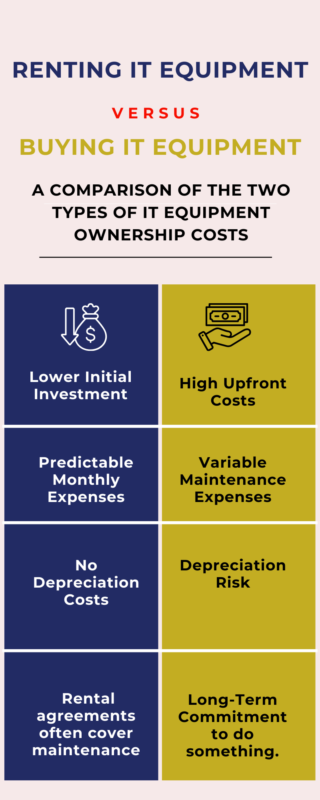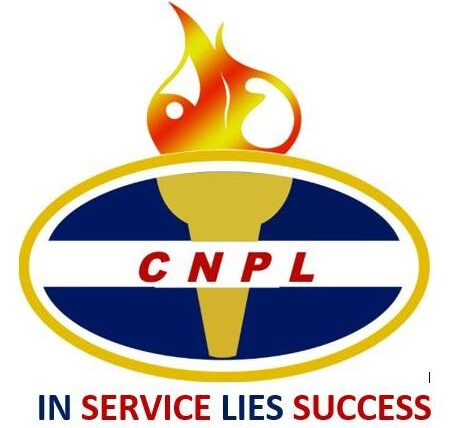Top Benefits of Renting IT Networking Equipment vs. Buying for Smart Business Solutions

Introduction
In today’s rapidly changing technology landscape, IT leaders and managers frequently face a key decision: should we rent or purchase networking equipment? Imagine this scenario of an IT manager at a growing startup experiencing an unexpected spike in demand for their services.
This situation presents a critical choice that can significantly impact the company’s agility and growth. Whether opting for rental or purchase, the decision lies in balancing immediate needs with long-term strategy.
Our blog aims to highlight the benefits of renting IT networking equipment vs buying. Instead of owning equipment, renting provides flexibility for organizations to adjust their IT capabilities without the additional costs of maintenance and depreciation. Our goal is to provide insights that will enable IT managers to make informed decisions, thus improving operational efficiency and financial health in their organizations.

Cost Savings:
Initial Investment Reduction
Renting equipment will significantly reduce the initial financial burden on businesses. Unlike purchasing equipment, which often requires substantial upfront costs, renting allows companies to conserve capital and allocate funds to other critical areas such as marketing or research and development. This flexible approach to growth can be very useful for startups and small businesses that are looking for ways to expand without spending a lot of money.
Predictable Expenses
One of the primary benefits of rental agreements is the predictability they provide. With regular monthly payments, businesses may easily include these expenses in their budgets, allowing for more effective financial planning. Renting equipment can assist businesses avoid unforeseen expenses related to equipment maintenance and depreciation, allowing them to concentrate on growth and efficiency.
Tax Benefits
Renting could also provide significant tax savings. In many jurisdictions, rental payments are considered operating expenditures and can be completely deducted from taxable income. This can result in significant tax savings, improved cash flow, and increased business growth.
Access to the Latest Technology:
Avoiding Obsolescence
Renting technology allows businesses to sidestep the rapid obsolescence associated with purchasing equipment. In today’s fast-paced technological landscape, new models and advancements emerge frequently, making it challenging for companies to keep up. By opting to rent, businesses can ensure they always have access to the latest innovations without the hassle of frequent upgrades or the financial burden of purchasing new equipment. This approach not only mitigates the risk of obsolescence but also enhances operational efficiency by allowing companies to focus on their core activities rather than worrying about outdated technology.
Regular Upgrades
Another significant advantage of renting is the opportunity for regular upgrades. Rental agreements often include provisions for accessing newer models with advanced features, which can substantially enhance business operations and competitiveness.
This ensures that organizations can leverage the latest tools and capabilities, positioning them ahead of competitors that older systems may constrain. By integrating state-of-the-art technology into their operations, businesses can improve efficiency, streamline processes, and ultimately drive growth.
Flexibility and Scalability:
Adapting to Business Needs
Renting equipment provides businesses with the essential flexibility to scale their operations according to current demands. As market conditions fluctuate, organizations can quickly adjust their equipment needs—whether scaling up for a new project or down during slower periods—without the constraints of long-term commitments. This adaptability is crucial for effective resource management, allowing businesses to respond swiftly to changes without incurring unnecessary costs.
Short-Term Projects
For short-term projects or events, renting equipment offers significant advantages. Businesses can meet temporary demands without the burden of long-term ownership, which is particularly beneficial for seasonal work or specific initiatives. By renting, companies can access the necessary tools without committing capital to assets that may only be needed briefly.
This approach not only conserves resources but also ensures that businesses can leverage the latest technology tailored to their immediate needs without long-term financial implications.
Maintenance and Support:
Reduced Maintenance Burden
One of the significant advantages of renting equipment is the reduced maintenance burden placed on businesses. Rental agreements often include provisions for regular maintenance and technical support, ensuring that the rented assets are always in optimal condition. This not only saves businesses time and effort but also provides peace of mind, knowing that professional assistance is readily available. By outsourcing maintenance responsibilities to the rental provider, companies can focus on their core activities without worrying about equipment upkeep.
Expert Assistance
Renting also provides businesses with access to professional support for installation, configuration, and troubleshooting. Rental providers typically have dedicated teams of experts who are well-versed in handling the equipment they offer. This expertise is invaluable for businesses, as it ensures a smooth setup process and minimizes downtime in case of any issues. With expert assistance readily available, companies can quickly resolve problems and maintain uninterrupted operations.
Risk Mitigation:
Financial Risk Reduction
Renting equipment effectively shifts the financial risk of ownership from businesses to rental providers. This arrangement protects companies from the depreciation and obsolescence that typically accompany ownership. As technology evolves rapidly, the value of owned equipment can decline significantly, leading to potential financial losses. By renting, businesses can avoid these pitfalls, allowing them to allocate resources more efficiently without the burden of asset management.
Insurance and Security
Rental agreements often come with built-in insurance and security measures, providing peace of mind regarding data protection and equipment reliability. This means that businesses are not only protected from physical damage but also benefit from safeguards against data breaches or loss of sensitive information. Many rental providers include comprehensive coverage in their contracts, which alleviates the need for companies to invest in separate insurance policies.
This combination of financial risk reduction and enhanced security measures makes renting a strategic choice for businesses looking to mitigate risks effectively while maintaining operational efficiency.
Conclusion
In summary, renting IT networking equipment offers numerous benefits that can significantly enhance your business operations. The key advantages include cost savings, as renting eliminates hefty upfront investments and provides predictable monthly expenses. Businesses also gain access to the latest technology, ensuring they remain competitive without the hassle of frequent upgrades.
The flexibility and scalability of rental agreements allow companies to adjust their equipment needs based on current demands, while maintenance support from rental providers reduces the burden of upkeep and technical issues. Finally, risk mitigation is achieved by shifting financial risks associated with equipment ownership to the rental provider, alongside built-in insurance and security measures.
Considering all these compelling benefits, businesses should explore renting as a viable option for their IT networking needs. We at Compulease Networks offer different rental services to meet diverse requirements, so companies can focus on what they do best-growing their business.
